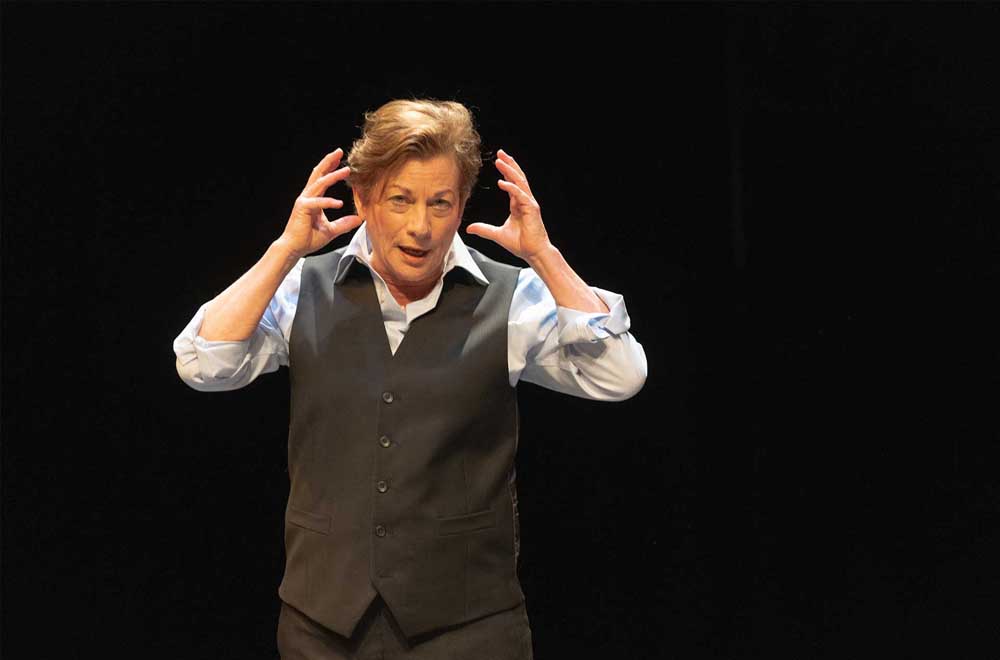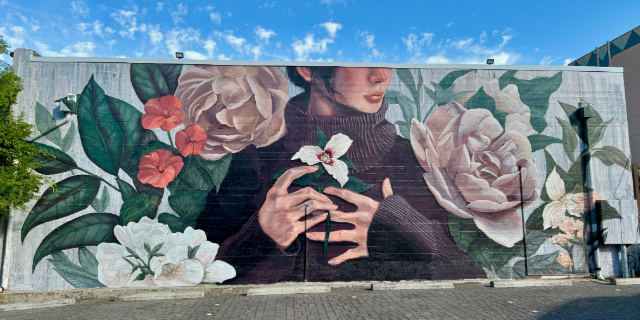THEATER REVIEW: OSF ‘Alchemy of Gender’
Published 12:00 pm Thursday, April 4, 2024

- Lisa Wolpe's "Shakespeare and the Alchemy of Gender" takes place on an empty stage, no props. Just Wolpe and interesting lighting.
Oregon Shakespeare Festival has opened its 2024 season with a remarkably introspective work, “Shakespeare and the Alchemy of Gender,” a story that coincidentally would seem to pick up where the final production of OSF’s 2023 season — “Where We Belong” — left off.
In “Where We Belong,” Achokayis, a native American woman, works through coming to terms with whether she can be a loyal, tribal daughter and still be a Shakespeare scholar.
In “Shakespeare and the Alchemy of Gender” the story follows a woman coming to terms with her history with strong men (her father), and brutal men (her stepfather). It’s about her quest to understand them — and subsequently herself — by invoking the male spirits of Shakespeare.
“Alchemy of Gender” is a one-hour, visceral, angry, amusing and remarkable true account of the life of Lisa Wolpe — a writer, director, actor and performance artist — who decided at a very young age that if she was going to survive men, she would have to inhabit the male psyche. And she succeeds.
As one audience member put it, Wolpe “took us from one character to another, like movements in a piece of classical music.”
Like Achokayis, Wolpe bares her Jungian, artistic soul. She leads us through her exploration of male gender identity — righteous indignation, heroic strength and self doubt — by exposing the consequences of toxic masculinity, while reaching out and embodying various male Shakespearean roles.
These roles all at once possess the characteristics of men she has grown to despise (her stepfather), men she identifies with (Hamlet), men who can be cold, threatening, passionate or uplifting (Henry the V) and men she deeply emulates (her father).
Wolpe has a definite affinity for and identifies strongly with Hamlet, who she says has a philosopher’s soul and “who poses important questions and has a heroic bandwidth. His arc, his quest (like hers) includes investigating the predominance of the male human in the universal order and entertains what a profound disappointment a man can be.”
She isn’t male-bashing here. She’s actually letting us know how hard it is to be one.
This is also Wolpe’s story. She recounts an unhappy childhood. Her father was descended from a long line of Hebrew rabbis and as a revered Jewish leader in his community, ferociously fought against and garnered victories over the Nazis in World War II. The Holocaust and war took its toll on him, however, and when Wolpe was four, he committed suicide.
Her mother remarried and moved to a small Catholic island off Spain. It was there Wolpe was subjected to cruelties by her stepfather, a sexual predator. This brave girl, in order to protect herself from this tyrant, “cross-gendered” and took on male attributes.
The theme of suicide figures prominently in this work, for which Wolpe finds great parallels to Hamlet’s dilemma posed in his “To be or not to be,” soliloquy. She then presents us with some sobering statistics on the prevalence of suicide, domestic violence, and the chasm of despair that accompanies it.
As Wolpe tells her story, the phrase “tour de force” seems inadequate here, because she transforms before our eyes. It’s almost as if she is moving about a boxing ring, bouncing and dodging the “slings and arrows of outrageous fortune.”
One can almost envision the ghosts of Robert Bly, the celebrated American poet who was the leader of the mythopoetic men’s movement and Maya Angelou, standing on the sidelines, cheering her on.
This is a dark piece. It is adult-rated. The subjects are serious, profound and disturbing. There is even a disclaimer in the program, “contains stories of domestic abuse, family suicide …and traumatic Holocaust experiences.” That being said, there is also salvation in Wolpe’s story.
“I think Shakespeare saved my life,” she reveals. And like the native American woman in the play before hers, she identifies with the healing aspects of earth, water, air and fire rendered through the trials and sacredness of her experience.
The story takes place on an empty stage, no props. Just Wolpe and interesting lighting, responding to her ever-shifting moods and the ghosts of her characters waiting for her to call them in. The illuminations are executed by Valerie Pope, lighting designer. There is also a fine director, Laurie Woolery, guiding Wolpe through a series of deliberate personality changes that were a wonder to observe.
And don’t let the minimalist vibe fool you, there’s an entire creative team behind this production. Wolpe not only wrote this, but has led a long fight for gender parity in the arts. She founded the Los Angeles Women’s Shakespeare Company. You know that saying? Behind every successful man there’s a woman? Well in this case Wolpe embodies both of them.
Be sure to stay for the closing ceremony and community conversation where audience members are invited to dialog with Wolpe about the story and themes.
Performances of “Shakespeare and the Alchemy of Gender” will be given in the Thomas Theatre at the Oregon Shakespeare Festival, 15 S. Pioneer St., Ashland, through May 4. Tickets start at $35. Showtimes, ticket prices and information available at osfashland.org or at 800-219-8161. Group discounts available.






